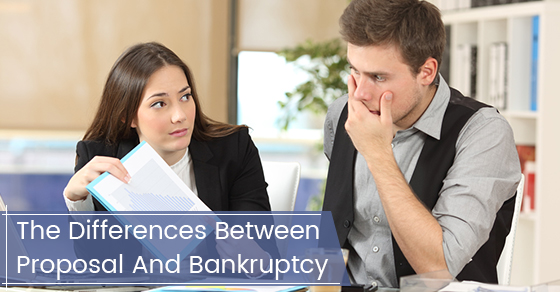Those looking to regain control of their finances have the option to choose between proposals, debt consolidation and bankruptcy. It’s important to become informed about your options – this is the first proactive step towards creating a secure financial future.
Specifically, understanding the distinction between proposals and bankruptcy will help you to determine the best course of action for ensuring your long-term financial health.
If you are deciding between bankruptcy and proposals, and would like to know which is best suited to your needs, the below information will help you make the best decision.
Bankruptcy
Bankruptcy is the process of trading your assets, except for those which are exempt under the law, in exchange for relief from debt. When an individual files for bankruptcy, any and all collection activity by creditors will stop. Creditors cannot opt out of this process and once you have completed your bankruptcy all relevant debts are discharged..
Proposals
There are two types of proposals. The first is a Consumer Proposal, which is only an option if you owe less than $250,000, excluding the mortgage on your principal residence. As in all proposals, your insolvency trustee helps you make an offer to your creditors to repay a specified sum of money that you and your trustee think is reasonable and feasible. The majority must decide if a consumer proposal is accepted and unsecured creditors get one vote for each dollar owed plus more than half of the creditors must be in favour of your offer. Payments are made to your trustee and divided amongst creditors in a prescribed payment schedule. Court approval can be deemed automatic for a Consumer Proposal.
The second type of proposal, a Division I Proposal in which your insolvency trustee again makes an offer to your creditors for you to repay a specified sum of money that you and your trustee think is reasonable and feasible. Again, the majority of creditors must vote in favour of the offer however the offer must be approved by the court and if this type of proposal is not accepted by your creditors or the court you will be deemed bankrupt.
Which is best for you?
It’s important to take into account the size of your debt, whether you are an individual or a company, your surplus income and monthly income, among other considerations. A Licensed Insolvency Trustee can very helpful explaining your options so you can decide which option is best for you.
For example, conversely to a proposal, a bankruptcy is available to both individuals and companies, and there is no limit on the size of your debt. However, if you are an individual owing less than $250,000, a consumer proposal might be the best option for you depending on your current financial situation.
Whether you decide to file for a bankruptcy or a proposal, both options carry with them unique costs and benefits. However, proposals and bankruptcies both offer you protection from creditors and the opportunity to resolve your debt. Speaking with a licensed insolvency trustee will help you to make the best decision for your financial future.

